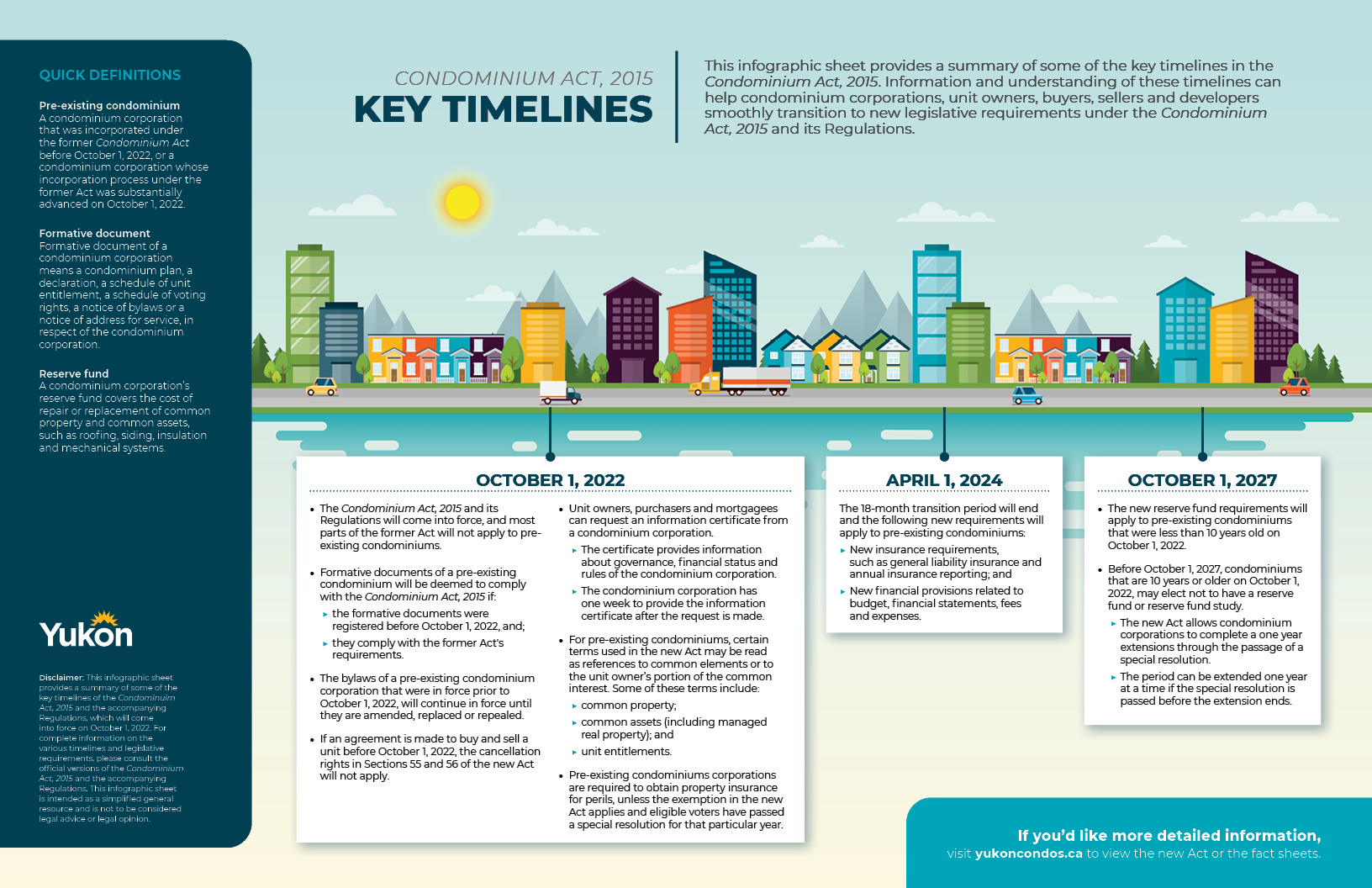Resources
Helpful resources on the Condominium Act, 2015.
Fact sheets
These fact sheets provide information about the Condominium Act, 2015, and its Regulations, which came into force on October 1, 2022. We intend the fact sheets to be a simplified general resource. You should not consider the fact sheets to be legal advice or opinion. Seek legal advice about any specific issues.
You can view and download the following fact sheets.
Condominium Fact Sheet #1: an introduction to condominiums
Condominium Fact Sheet #2: reserve funds
Condominium Fact Sheet #3: insurance
Condominium Fact Sheet #4: condominium bylaws
Condominium Fact Sheet #5: meetings and voting rights
Condominium Fact Sheet #6: purchasing and owning a condominium unit
Condominium Fact Sheet #7: condominium types
Condominium Fact Sheet #8: bare land condominium
Condominium Fact Sheet #9: converted building condominium
Condominium Fact Sheet #10: condominiums on leasehold land
Condominium Fact Sheet #11: phased development condominium
Condominium Fact Sheet #12: mixed use development
Condominium Fact Sheet #13: information certificates
Condominium Fact Sheet #14: resolving condominium disputes

Timeline infographic

Take a look at this timeline infographic to help you understand when the Act and Regulations will apply to you. You can also view the infographic as a downloadable PDF.
Common questions
When was legislation updated?
What can be found in the Regulations?
- reserve fund requirements;
- specific types of condominiums such as phased, leasehold, bare land and converted building;
- budgeting, investments, financial statements and audit requirements;
- insurance, fines and records retention;
- the provision of additional documents to a purchaser and cancellation rights concerning the sale agreement; and
- governance mechanisms.
Are previous bylaws 'grandfathered' in or are they unenforceable?
- amended;
- added to;
- replaced; or
- repealed.
How will developers and condominium corporations establish reserve funds?
Is there a transitional period to comply with reserve fund requirements?
Pre-existing condominium corporations that are 10 years or older on October 1, 2022
Pre-existing condominium corporations that are less than 10 years old
What type of insurance does your condominium corporation need?
- fire, or any other peril described in the Condominium General Regulation;
- claims by 3rd parties; and
- acts or omissions of the board of directors.
You own a residential condominium unit – what happens if you get into a disagreement with the condominium corporation or with another unit owner?
- condominium unit owners; or
- condominium unit owners and boards.
You own a residential condominium unit and want to rent it to someone. Are there special rules you have to follow?
- the Yukon’s Residential Landlord and Tenant Act;
- the requirements of the Condominium Act, 2015; and
- your condominium corporation’s bylaws and rules.
- condominium corporation’s bylaws and rules; and
- a list of any other tenant’s responsibilities.
Where can you find more information about the Act and Regulations?
The Land Titles Office can provide you with information about:
- the process and documents that must be registered to create a condominium;
- annual filings for condominium corporations; and
- other filing requirements for condominium corporations.
The Land Titles Office cannot:
- provide legal advice;
- help you fill out forms;
- interpret legislation for you; or
- give you advice about your condominium corporation’s bylaws or rules.
Find out more about the Land Titles Office.
Additionally, a lawyer or real estate professional, as appropriate, who is experienced in condominium transactions may help you understand your rights and obligations as a:
- developer;
- member of a condominium board of directors;
- potential purchaser of a condominium; or
- unit owner.